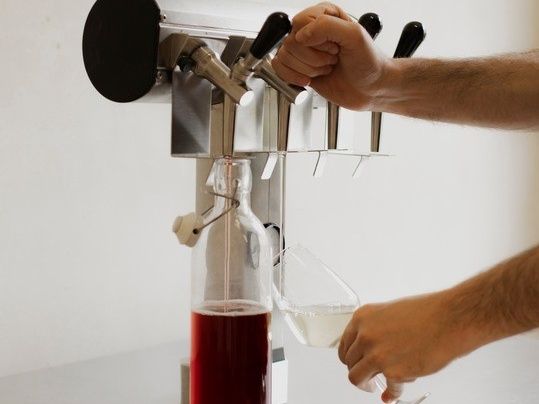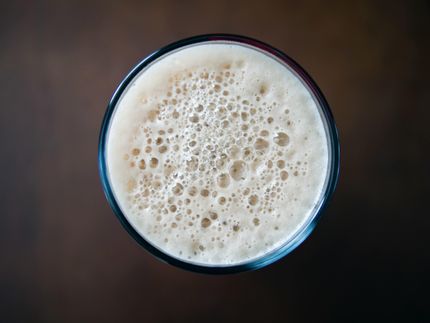Tapping for the future: wine in reusable barrels
Start-up develops reusable system with DBU funding
Advertisement
Whether mulled, red or white wine, alcoholic beverages are still predominantly sold in disposable glass bottles with labels, cartons and caps. The consequences: a lot of waste and high emissions of the greenhouse gas carbon dioxide (CO2). The start-up Ebb & Flow Keg is working on a reusable system with funding from the German Federal Environmental Foundation (DBU). Wine is filled into large stainless steel kegs instead of glass bottles - and tapped in restaurants in a similar way to beer.

Until now, wine has mainly been sold in disposable glass bottles. The consequences: a lot of waste and high emissions of the greenhouse gas carbon dioxide (CO2). The start-up Ebb & Flow Keg is working on a reusable system with funding from the German Federal Environmental Foundation (DBU). Wine is filled into large stainless steel kegs instead of glass bottles - and tapped in restaurants in a similar way to beer.
© Marie Haefner
"The disposable glass bottle causes around half theCO2 footprint of a bottle of wine"
Packaging in particular has a major impact on the environmental footprint of wine: "The disposable glass bottle causes around half of theCO2 footprint of a bottle of wine," says Dr. Volker Berding, Head of the DBU's Resource Management Department. The lifespan of the bottles is usually quite short because wine is often consumed shortly after bottling. Berding: "The elaborately produced glass bottles therefore almost immediately become waste again." It is true that a large proportion of glass is recycled in Germany. But, according to Berding: "This also requires a lot of energy for transportation or melting, for example, before the resources are returned to the supply chain." One way out: according to Berding, reusable packaging can reduce the consumption of energy and raw materials in the wine industry. However, the necessary infrastructure is still lacking. "Although there are already reusable solutions for many drinks, both for private consumers and for restaurants and catering, there are hardly any comparable approaches for wine," explains the DBU expert.
Reusable system for a sustainable wine culture
The start-up Ebb & Flow Keg from Frankfurt am Main wants to change this. With DBU funding, the team is building a reusable infrastructure for wine. The young company wants to use this to replace disposable glass bottles in the restaurant, catering and festival sectors. "We go to the winegrowers and fill the wine into kegs - these are large, reusable barrels made of stainless steel," explains Deandra Anderson, who founded Ebb & Flow Keg together with Philipp Neveling . The wine in the kegs is sold to restaurants and catering companies, for example. According to Anderson, the kegs can be easily connected to existing tapping systems. "After use, we collect the kegs and clean them - then they are ready for use again," explains Anderson. "A keg has a lifespan of up to 30 years." According to the startup, each 20-liter keg replaces around 27 wine bottles including labels, corks and cartons per filling. In addition, the keg-based reusable system saves up to 40 percentCO2 emissions and storage space compared to the use of conventional wine bottles. "In this way, everyone involved - from producers and restaurants to consumers - supports a reusable system and thus a sustainable wine culture," says the founding team.
Start-up works on digital solutions for the reusable system in the DBU project
With the help of the DBU funding, the start-up wants to implement digital solutions for the infrastructure. "The digital tools support us with return logistics and process optimization," says Anderson. The team also wants to further expand the infrastructure with a filling and cleaning station, for example. "A reusable system for wine bottling reduces the waste and energy consumption caused by disposable packaging and helps to reduce the ecological footprint of the wine industry," says DBU expert Berding. A desirable side effect: if wine is tapped from a barrel in a way that is clearly visible to guests, for example, consumers may also become more aware of the benefits of a reusable system. Berding also sees other options: "In the future, the system could also be transferred to other liquid foods."
Note: This article has been translated using a computer system without human intervention. LUMITOS offers these automatic translations to present a wider range of current news. Since this article has been translated with automatic translation, it is possible that it contains errors in vocabulary, syntax or grammar. The original article in German can be found here.
Other news from the department business & finance
Most read news
More news from our other portals
Something is happening in the food & beverage industry ...
This is what true pioneering spirit looks like: Plenty of innovative start-ups are bringing fresh ideas, lifeblood and entrepreneurial spirit to change tomorrow's world for the better. Immerse yourself in the world of these young companies and take the opportunity to get in touch with the founders.
































































